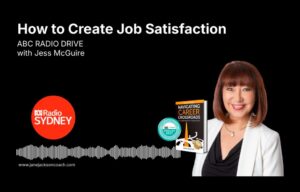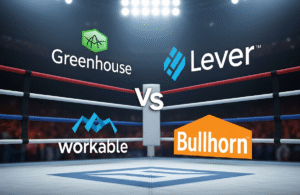
Caught Between a Rock and a Hard Place: The Age Discrimination Crisis Hitting Australian Workers
Is this you? Like many of my clients in career transition, are you about 52 years of age, highly experienced, and suddenly facing redundancy?
You dust off your resume, update your LinkedIn profile, and start applying for roles.
Meanwhile, your 23-year-old neighbour is doing the same thing after graduating university.
What you might not realise is that both of you are walking into the same brick wall. The latest research reveals just how solid that wall has become.
[Prefer to listen rather than read? Listen to the podcast episode now.]
The Uncomfortable Truth About Age Bias in Hiring
Fresh research from the Australian Human Rights Commission and the Human Resources Institute has delivered some sobering news that affects millions of Australian workers.
The findings paint a picture that would be laughable if it weren’t so devastating: employers are simultaneously crying out for workers while systematically excluding large chunks of the workforce based purely on age.
Think about the absurdity for a moment.
We’re constantly told about skills shortages, with more than half of employers (55%) reporting hard-to-fill vacancies.
Yet these same employers are turning their backs on experienced professionals and eager young graduates alike. What on earth is going on?
It appears that if you are between the ages of 25 – 50, you have 25 years to make as much money as you can, so you won’t have to worry about age discrimination in the future.
Most of us have been told that the average person will spend 90,000 hours at work over a lifetime.
So, if we work 40 hours a week for 1 year (50 weeks with 2 weeks holiday/year) that’s 2000 hours.
This means we’d have to work 45 years to reach the average 90,000 hours at work!
If we’re only attractive as an employee for 25 years, how do we get to 90,000 hours? A typical career span is supposed to be 40 years. Confusing isn’t it?
The Numbers Don’t Lie, But They Do Shock
Here’s where the research gets particularly confronting.
Almost a quarter (24%) of HR professionals now classify workers aged over 50 as “older”. That’s up a staggering 10% from previous years.
Let that sink in for a moment.
At 51, you’re not even close to retirement, yet you’re already being labelled as past your prime.
The hiring statistics reveal the harsh reality facing Australian workers:
- Only 56% of employers are open to hiring workers aged 50-64 “to a large extent”
- This plummets to just 28% for those 65 and over
- At the younger end, merely 41% are willing to recruit job seekers aged 15-24
It’s like watching a game of musical chairs where most of the chairs have been removed before the music even starts.
The Irony of Modern Workplace Thinking
What makes this situation particularly maddening is the disconnect between perception and productivity needs. Age Discrimination Commissioner Robert Fitzgerald pointed out the value of age-diverse teams, and the research backs this up with hard data.
A comprehensive six-year German study of more than 745 teams with 8,848 employees across car production, administrative work, and financial services found significant advantages for age-mixed teams when certain conditions were met as discovered by Research Gate. NOTE: A synopsis of the findings (which are fascinating) included at the end of this article.
Additionally, research shows that cognitively diverse teams – which includes age diversity – solve problems faster. NOTE: Synopsis of findings included at the end of this article.
The research confirms this wisdom. Older workers consistently rated higher for loyalty, reliability, and stress management which is exactly the qualities most organisations desperately need during uncertain times. Yet nearly 60% of employers admitted that when older workers leave, key skills walk out the door with them.
It’s rather like throwing away your most reliable tools while complaining you can’t fix anything.
The Technology Myth That’s Holding Everyone Back
One of the biggest misconceptions that seem to fuel this discrimination centres around technology skills.
Only 1% of survey respondents believed older workers had better tech abilities – a statistic that would be amusing if it weren’t so damaging to careers. If an individual (regardless of age) is willing to dedicate time to learn specific skills this should negate the perception by 99% of respondents!
Here’s what employers are missing: the professionals who, over many years have navigated MULTIPLE technology transitions, learned new systems repeatedly, and adapted to changing digital landscapes aren’t technology-challenged – they’re technology-resilient.
They’ve proven their ability to learn and adapt time and again.
Why This Matters for Mid-Career Professionals
If you’re reading this and you’re somewhere between 45 and 60, this research should serve as both a wake-up call and a call to action. The landscape has shifted, and waiting for employers to change their attitudes isn’t a viable career strategy.
There are some positive signs. Nearly three in four businesses now offer flexible working arrangements (up from 49% in 2021) as a recruitment strategy to support age-diverse hiring, with flexible work options being a top priority for workers to stay longer
Navigating Your Path Forward
The reality is that traditional job search approaches may not serve you well in this environment.
Sending out resumé after resumé online, hoping the ATS (Applicant Tracking System) will screen you in, and that the resulting phone screen (potentially) will result in a face-to-face interview just isn’t happening for most job seekers in the current job market.
You need strategies that showcase your value proposition clearly, networking approaches that bypass age-biased screening processes, and positioning that makes your experience irresistible rather than overlooked.
Sarah McCann-Bartlett from the Australian HR Institute captured the challenge perfectly: we need to shift “from age-based assumptions to evidence-based strategies.”
My question to you is, “Are you ready to lead that shift in how you present yourself to the market?”
Your experience, wisdom, and proven track record aren’t just valuable, they’re essential for Australia’s economic future.
The challenge is ensuring the right employers recognise your value.
Are you ready to navigate this challenging landscape with confidence?
The research is clear about the obstacles, but there are proven strategies to overcome them.
Discover how to position yourself effectively and access ongoing support through my Career Success Program. I designed this program specifically for professionals facing these exact challenges and I’ve made it ridiculously affordable for everyone because I’ve had enough of age discrimination.
There is no shame in asking for help during challenging times. Why not join me today and let’s position you as a person of influence in your field!
Take control of your career today. Join my CAREER SUCCESS PROGRAM
—————
I’m Jane Jackson, career coach and author of Navigating Career Crossroads. I’ve made multiple career transitions, and 5 country moves from Hong Kong to San Francisco, London to Singapore and now Sydney. Some transitions were by choice; some were out of necessity. Not all went as smoothly! However, through many of life’s ups and downs I was determined to reinvent my career and consequently have created a career path that is satisfying and rewarding.
I’m now 66 and for over 24 years I’ve supported thousands of professionals through the emotional roller coaster of redundancy and to create the career they deserve. I have no plans to stop doing what I love and provide what the world needs (my IKIGAI). Why retire when you love what you do?
Join my CAREER SUCCESS PROGRAM and gain instant access to the support you need to take control of your career.
If you’re self-directed and need accountability, join me and build our community of professionals who want to work, contribute and make a difference in our chosen professions – regardless of our age!
Join me now at https://www.thecareersacademy.online/career-success-program

FINDINGS FROM RESEARCH GATE:
Age Diversity:
- Better Performance in Complex Tasks: Teams with a mix of younger and older workers did better (faster work) on complicated tasks, like handling tricky tax cases. This held true over two years.
- Health Issues in Routine Tasks: In simpler, repetitive tasks, teams with varied ages reported more health problems (like stress or pain). Complex tasks didn’t show this issue, possibly because they allow older workers to use their experience to cope better.
Gender Diversity:
- Better Performance in Big Teams: Larger teams with a mix of men and women performed better (faster work) than teams with mostly women. This was less clear in smaller teams.
- Fewer Health Issues in Big Teams: In larger teams, gender diversity led to fewer health complaints, suggesting a balanced mix of men and women might reduce stress.
Why Context Matters:
- The type of task (complex vs. routine) affects how age diversity impacts performance and health. Complex tasks benefit from age diversity, while routine tasks don’t.
- The size of the team matters for gender diversity. Bigger teams see more benefits from having both men and women.
Implications
- For Managers: Mix ages in teams doing complex work for better results and healthier workers. For routine tasks, be cautious with age diversity to avoid health issues. In big teams, aim for a balance of men and women to boost performance and well-being.
Key Positive Explanations for Age Diversity
Diverse Knowledge and Perspectives:
- Age-diverse teams combine varied life and work experiences, fostering innovative ideas and better problem-solving, especially for creative tasks.
Potential for Improved Performance:
- Age diversity can enhance team performance in complex tasks by encouraging thorough discussions and critical thinking.
Support for Knowledge Transfer:
- Age-diverse teams enable younger and older workers to share skills, preserving valuable expertise within organizations.
Reducing Age Stereotypes:
- Age diversity promotes inclusive workplaces, reducing age-related biases and valuing contributions from all age groups.
Context-Specific Benefits:
- In younger teams or complex tasks, age diversity can spark creativity and balance fresh ideas with experienced insights.
REFERENCE SOURCES:
NATIONAL SENIORS AUSTRALIA
https://nationalseniors.com.au/news/news/job-hunting-seniors-face-ageism-barrier
RESEARCH GATE
https://www.researchgate.net/publication/23489222_Age_and_Gender_Diversity_as_Determinants_of_Performance_and_Health_in_a_Public_Organization_The_Role_of_Task_Complexity_and_Group_Size
https://www.researchgate.net/publication/266738788_Age_diversity_and_team_outcomes_A_quantitative_review




